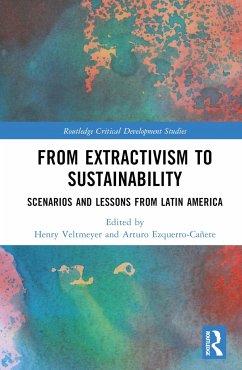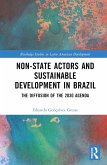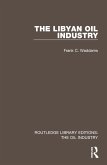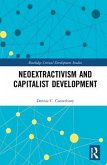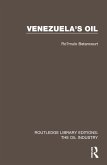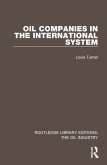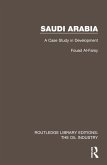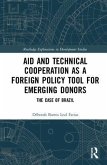From Extractivism to Sustainability
Scenarios and Lessons from Latin America
Herausgeber: Veltmeyer, Henry; Ezquerro-Cañete, Arturo
From Extractivism to Sustainability
Scenarios and Lessons from Latin America
Herausgeber: Veltmeyer, Henry; Ezquerro-Cañete, Arturo
- Gebundenes Buch
- Merkliste
- Auf die Merkliste
- Bewerten Bewerten
- Teilen
- Produkt teilen
- Produkterinnerung
- Produkterinnerung
This book investigates how extractive capitalism has developed over the past three decades, what dynamics of resistance have been deployed to combat it, and whether extractivism can ever be transformed into being a part of a progressive development path.
Andere Kunden interessierten sich auch für
![Non-State Actors and Sustainable Development in Brazil Non-State Actors and Sustainable Development in Brazil]() Eduardo Gonçalves GresseNon-State Actors and Sustainable Development in Brazil153,99 €
Eduardo Gonçalves GresseNon-State Actors and Sustainable Development in Brazil153,99 €![The Libyan Oil Industry The Libyan Oil Industry]() Frank C. WaddamsThe Libyan Oil Industry135,99 €
Frank C. WaddamsThe Libyan Oil Industry135,99 €![Neoextractivism and Capitalist Development Neoextractivism and Capitalist Development]() Dennis C CanterburyNeoextractivism and Capitalist Development185,99 €
Dennis C CanterburyNeoextractivism and Capitalist Development185,99 €![Venezuela's Oil Venezuela's Oil]() Rómulo BetancourtVenezuela's Oil116,99 €
Rómulo BetancourtVenezuela's Oil116,99 €![Oil Companies in the International System Oil Companies in the International System]() Louis TurnerOil Companies in the International System116,99 €
Louis TurnerOil Companies in the International System116,99 €![Saudi Arabia Saudi Arabia]() Fouad Al-FarsySaudi Arabia116,99 €
Fouad Al-FarsySaudi Arabia116,99 €![Aid and Technical Cooperation as a Foreign Policy Tool for Emerging Donors Aid and Technical Cooperation as a Foreign Policy Tool for Emerging Donors]() Déborah Barros Leal FariasAid and Technical Cooperation as a Foreign Policy Tool for Emerging Donors180,99 €
Déborah Barros Leal FariasAid and Technical Cooperation as a Foreign Policy Tool for Emerging Donors180,99 €-
-
-
This book investigates how extractive capitalism has developed over the past three decades, what dynamics of resistance have been deployed to combat it, and whether extractivism can ever be transformed into being a part of a progressive development path.
Produktdetails
- Produktdetails
- Verlag: Taylor & Francis
- Seitenzahl: 312
- Erscheinungstermin: 2. März 2023
- Englisch
- Abmessung: 234mm x 156mm x 19mm
- Gewicht: 644g
- ISBN-13: 9781032295213
- ISBN-10: 103229521X
- Artikelnr.: 66737823
- Herstellerkennzeichnung
- Libri GmbH
- Europaallee 1
- 36244 Bad Hersfeld
- gpsr@libri.de
- Verlag: Taylor & Francis
- Seitenzahl: 312
- Erscheinungstermin: 2. März 2023
- Englisch
- Abmessung: 234mm x 156mm x 19mm
- Gewicht: 644g
- ISBN-13: 9781032295213
- ISBN-10: 103229521X
- Artikelnr.: 66737823
- Herstellerkennzeichnung
- Libri GmbH
- Europaallee 1
- 36244 Bad Hersfeld
- gpsr@libri.de
Henry Veltmeyer is Senior Research Professor at the Universidad Autónoma de Zacatecas, Mexico, and Professor Emeritus of International Development Studies (IDS) at Saint Mary's University, Canada, with a specialized interest in Latin American development. Arturo Ezquerro-Cañete is Research Fellow at the Center for Advanced Latin American Studies in the Humanities and Social Sciences (CALAS) at the University of Guadalajara, Mexico.
Introduction Part 1: The Contemporary Dynamics of Global Capitalism 1: The
contradictions and verities of capitalism 2: The geoeconomics and
geopolitics of extractive capital in Latin America Part II: Extractivism in
the Mines and the Countryside: Development Dynamics 3: Mexico's mining and
petroleum policies under AMLO: A turn to neo-extractivism? 4: The power
politics of agro-extractivism for sustainability transformations 5: Water,
Land and Gold: Extractivism and the environment in Colombia Part III:
Towards a Sustainable Development Pathway: Extractivism or a New Industrial
Policy? 6: Is there a role for extractivism in a postdevelopment transition
towards sustainability? 7: The green energy transition: Expansion and
deepening of extractivism 8: The new geographies of an energy transition: A
challenge or a developmental opportunity? Part IV: Resistance on the
Extractive Frontier 9: Reloaded neo-extractivism, multi-actor conflicts and
alternative horizons: Keys to the socio-ecological crisis 10: Beyond
corporate social responsibility: New territorial management strategies for
defeating community-based resistance to extractivism 11: Communities in
resistance: Forging the communitarian revolutionary subject Part V:
Post-Extractivist Alternatives 12: Post-extractivist transitions: Concepts,
sequences and examples 13: Sumak Kawsay for Indigenous Women 14: Commune
socialism: Self-management, popular power and autonomy in Venezuela 15:
Beyond extractivism: Post-extractivist alternatives and pathways
contradictions and verities of capitalism 2: The geoeconomics and
geopolitics of extractive capital in Latin America Part II: Extractivism in
the Mines and the Countryside: Development Dynamics 3: Mexico's mining and
petroleum policies under AMLO: A turn to neo-extractivism? 4: The power
politics of agro-extractivism for sustainability transformations 5: Water,
Land and Gold: Extractivism and the environment in Colombia Part III:
Towards a Sustainable Development Pathway: Extractivism or a New Industrial
Policy? 6: Is there a role for extractivism in a postdevelopment transition
towards sustainability? 7: The green energy transition: Expansion and
deepening of extractivism 8: The new geographies of an energy transition: A
challenge or a developmental opportunity? Part IV: Resistance on the
Extractive Frontier 9: Reloaded neo-extractivism, multi-actor conflicts and
alternative horizons: Keys to the socio-ecological crisis 10: Beyond
corporate social responsibility: New territorial management strategies for
defeating community-based resistance to extractivism 11: Communities in
resistance: Forging the communitarian revolutionary subject Part V:
Post-Extractivist Alternatives 12: Post-extractivist transitions: Concepts,
sequences and examples 13: Sumak Kawsay for Indigenous Women 14: Commune
socialism: Self-management, popular power and autonomy in Venezuela 15:
Beyond extractivism: Post-extractivist alternatives and pathways
Introduction Part 1: The Contemporary Dynamics of Global Capitalism 1: The
contradictions and verities of capitalism 2: The geoeconomics and
geopolitics of extractive capital in Latin America Part II: Extractivism in
the Mines and the Countryside: Development Dynamics 3: Mexico's mining and
petroleum policies under AMLO: A turn to neo-extractivism? 4: The power
politics of agro-extractivism for sustainability transformations 5: Water,
Land and Gold: Extractivism and the environment in Colombia Part III:
Towards a Sustainable Development Pathway: Extractivism or a New Industrial
Policy? 6: Is there a role for extractivism in a postdevelopment transition
towards sustainability? 7: The green energy transition: Expansion and
deepening of extractivism 8: The new geographies of an energy transition: A
challenge or a developmental opportunity? Part IV: Resistance on the
Extractive Frontier 9: Reloaded neo-extractivism, multi-actor conflicts and
alternative horizons: Keys to the socio-ecological crisis 10: Beyond
corporate social responsibility: New territorial management strategies for
defeating community-based resistance to extractivism 11: Communities in
resistance: Forging the communitarian revolutionary subject Part V:
Post-Extractivist Alternatives 12: Post-extractivist transitions: Concepts,
sequences and examples 13: Sumak Kawsay for Indigenous Women 14: Commune
socialism: Self-management, popular power and autonomy in Venezuela 15:
Beyond extractivism: Post-extractivist alternatives and pathways
contradictions and verities of capitalism 2: The geoeconomics and
geopolitics of extractive capital in Latin America Part II: Extractivism in
the Mines and the Countryside: Development Dynamics 3: Mexico's mining and
petroleum policies under AMLO: A turn to neo-extractivism? 4: The power
politics of agro-extractivism for sustainability transformations 5: Water,
Land and Gold: Extractivism and the environment in Colombia Part III:
Towards a Sustainable Development Pathway: Extractivism or a New Industrial
Policy? 6: Is there a role for extractivism in a postdevelopment transition
towards sustainability? 7: The green energy transition: Expansion and
deepening of extractivism 8: The new geographies of an energy transition: A
challenge or a developmental opportunity? Part IV: Resistance on the
Extractive Frontier 9: Reloaded neo-extractivism, multi-actor conflicts and
alternative horizons: Keys to the socio-ecological crisis 10: Beyond
corporate social responsibility: New territorial management strategies for
defeating community-based resistance to extractivism 11: Communities in
resistance: Forging the communitarian revolutionary subject Part V:
Post-Extractivist Alternatives 12: Post-extractivist transitions: Concepts,
sequences and examples 13: Sumak Kawsay for Indigenous Women 14: Commune
socialism: Self-management, popular power and autonomy in Venezuela 15:
Beyond extractivism: Post-extractivist alternatives and pathways

